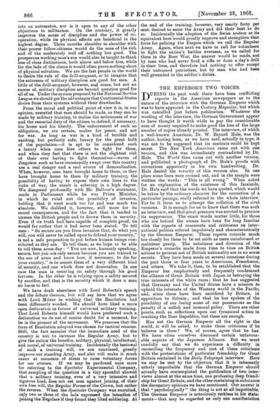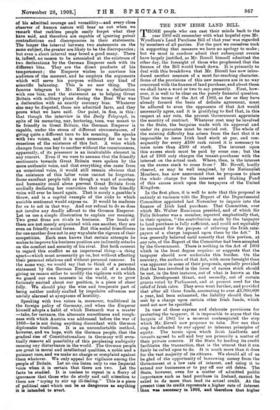THE EMPEROR'S TWO VOICES. D URING the past week there have
been conflicting reports in the American newspapers .as to the nature of the interview with the German Emperor which was to have appeared in the Century Magazine, but which was cancelled just before publication. Whatever the wording of the interview, the German Government appear to have thought it worth while to pay the considerable sum of money required to make good the loss of the large number of copies already printed. The interview, of which a well-known American, Dr. W. Bayard Hale, was the author, having been, as we have said, actually in type, it was not to be supposed that its contents 'could be kept secret. The New York American, came out with one version, and this was immediately contradicted by Dr. Hale. The World then came out with another version, and published a photograph of Dr. Hale's proofs with corrections apparently in his own handwriting. Dr. Hale denied the veracity of this version also. In one place some lines were crossed out, and in the margin were written the words : " This is all wrong." When asked for an explanation of the existence of this facsimile, Dr. Hale said that the words we have quoted, which would be taken by the ordinary observer for the correction of 5, particular passage, really referred to the whole interview. Far be it from us to attempt the collation of the rival versions. It is enough for us to know that there was such an interview, and that great pressure was exerted to procure its suppression. The exact words matter little, for-those who are behind the scenes have been for long familiar with the reports of comments and criticisms on inter- national politics uttered impulsively and characteristically by the German Emperor. These reports coincide much too closely for them to be set aside as mere uninformed or malicious gossip. The substance and direction of the Emperor's remarks made from time to time on British actions to persons not of British nationality are in no sense secrets. They have been made on several occasions during the past three or four years to Americans, Frenchmen, and others. We take it, then, to be established that the Emperor has emphatically and frequently condemned the alliance of Great Britain with Japan as betraying the true interests of the white races ; that he has suggested that Germany and the United States have a mission to uphold the interests of the Western world in the Pacific, and, since these have been sacrificed by Britain, in opposition to Britain ; • and that he has spoken of the possibility of our losing some of our possessions as the penalty of a selfish and immoral policy. There are other points, such as reflections upon our tyrannical action in crushing the Boer Republics, but these are enough.
Has not the German Emperor all the right in the world, it will be asked, to make these criticisms if he believes in them We, of course, agree that he has We have often ourselves discussed certain unfavour- able •aspects of the Japanese Alliance. But we must candidly say that we do experience a difficulty ie. reconciling the frequency and zest of these criticisms with the protestations of particular friendship for Great Britain contained in the Daily Telegraph interview. Here we may be met by• the objection that it is inherently utterly improbable that- the German Emperor should actually have contemplated the publication of two inter= views almost at the' same time, One professing deep friend: ship for Great Britain, and the other containing iii 511bstanee the derogatory opinions we hare mentioned. Our answer is that " psychologically " the thing is not at all iniprebable. The German Emperor is notoriously reckless in his titan- ments—that may be regarded ac only one manifestation of his admitted courage and versatility—iind every close observer of human nature will bear us out when we remark that reckless people easily forget what they have said, and therefore are capable of ignoring patent bentradictions and disorepancies in their statements. The longer the interval between two statements on the Mine subject, the greater are likely to be the discrepancies but even a, short interval may breed a, good many. There id, indeed, no reason to be astonished at the existence of two deolarationt ' by the German' Emperor each with its different bias. They are the direct products of his temperament ; the Emperor wishes to convince his audience of the moment, and he employs the arguments which will serve his purpose without any kind of scientific balancing. This is no new thing. The famous telegram to Mr. Kruger was a declaration with one bias, and the statement as to helping Great Britain with military plans during the Boer War was a declaration with an exactly contrary bias. Whatever else may be disputed, these are admitted facts, and they prove what we have said. Our point, in fine, is this : that though the interview in the Daily Telegraph, in *pile of its menacing, nay, hectoring, tone, was meant to be friendly to Great Britain, the German Emperor is capable, under the stress of different circumstances, of giving quite a different turn to his meaning. He speaks with two voices, and it is most necessary for us to be conscious of the existence of this fact. A voice which changes from one key to another without the consciousness, apparently, of its possessor is an incalculable element in any concert. Even if we were to assume that the friendly sentiments. towards Great Britain were spoken by the more authentic voice, and that everything else came from an occasional voice, it would still remain obvious that the existence of this latter voice cannot be forgotten. Some excellent people talk as though a want of courtesy and humanity could. alone prevent Great Britain from cordially declaring her conviction that only the friendly voice will ever be heard again. That is surely a gambler's throw, and is a capital example of the risks to which amiable sentiment would expose us. It would be madness for us to act in that way. And our refusal to do so does not involve any 'deadly affront to the German Emperor. Let us use a simple illustration to explain our meaning. Two great firms are rivals in business. The heads of them are not merely acquainted with one another, they are even on friendly social terms. But this social friendliness for one another does not in any way abate the rigours of their competition. Each man knows that certain attempts he makes to improve his business position are indirectly attacks on the comfort and security of his rival. But both consent to regard this conflict as an impersonal thing—a, thing apart—which must necessarily go on, but without affecting their personal relations and without personal rancour. In the same way, we would say that to think of a personal statement by the German Emperor as all of a sudden giving us reason either to modify the vigilance with which we guard our own interests in the world, or to grow furiously excited about our position, is a piece of sheer folly. We should play the wise and temperate part of being neither unduly exalted by impulsive advances nor unduly alarmed at symptoms of hostility.
Speaking with two voices is, moreover, traditional in the foreign policy of Germany, and when the Emperor himself adopts a habit of which Bismarck was a. master —take, for instance, the alternate smoothness and rough- ness with which Austria was addressed before the war of 1866—he is not doing anything discordant with German diplomatic tradition. It is an uncomfortable method, however, and we hope, with the German people, that the gradual rise of Constitutionalism in Germany will even- tually remove all possibility of this perplexing ambiguity causing any disturbance in the world. The German people are great in moral and intellectual qualities, a noble and a puissant race, and we make no charge or complaint against them whatever. We only appeal for vigilance among the people of Britain. Let no one listen only to one Imperial voice when it is certain that there are two. Let the facts be studied. It is useless to repeat in a flurry of ignorance that those who do study and call attention to them are " trying to stir up ill-feeling." This is a piece of political cant which can be as dangerous as anything it is intended to avert.



















































 Previous page
Previous page